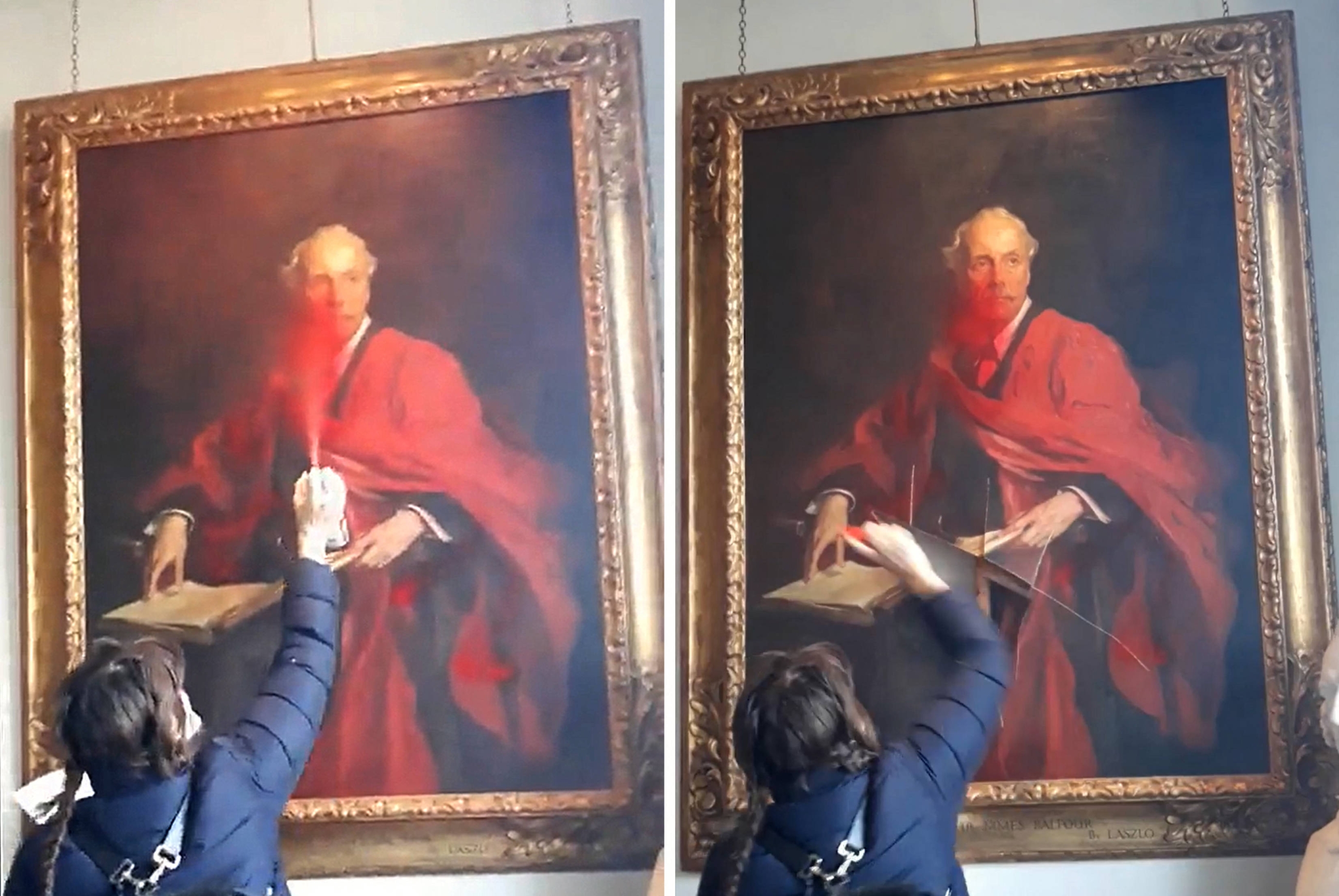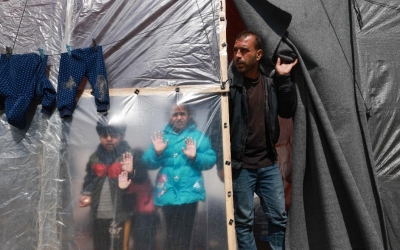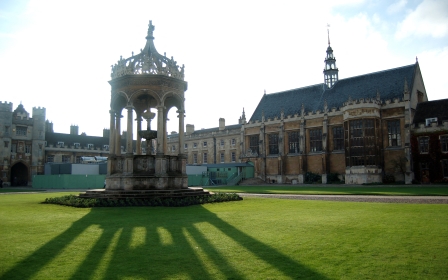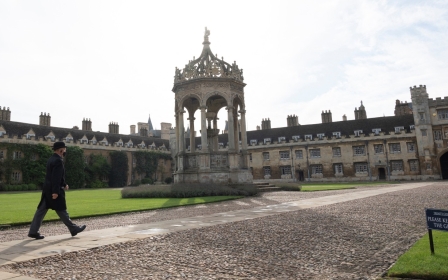Activist defaces Balfour portrait in Cambridge college investing in Israeli arms company

An activist from Palestine Action on Friday spray-painted then slashed a 1914 painting of Lord Balfour at Trinity College, the University of Cambridge's wealthiest constituent college.
The incident came after Middle East Eye revealed on 21 February that Trinity College has invested millions of dollars in companies arming, supporting and profiting from Israel's war on Gaza.
Last week, the UK-based International Centre of Justice for Palestinians (ICJP) issued a legal notice to Trinity warning that "officers, directors and shareholders at the college may be individually criminally liable if they maintain their investments in arms companies that are potentially complicit in Israeli war crimes and crimes against humanity".
The direct action group Palestine Action posted footage of the incident on X, formerly known as Twitter.
New MEE newsletter: Jerusalem Dispatch
Sign up to get the latest insights and analysis on Israel-Palestine, alongside Turkey Unpacked and other MEE newsletters
"Palestine Action ruined a 1914 painting by Philip Alexius de Laszlo inside Trinity College, University of Cambridge of Lord Arthur James Balfour - the colonial administrator and signatory of the Balfour Declaration," Palestinian Action said in a statement.
Conservative Member of Parliament Robert Jenrick said on Saturday that the person responsible for the action "should be in a cell, facing prison."
Political commentator Nigel Farage posted on X: "These people hate us."
Palestine Action replied: "You're right. We do hate you."
Lord Arthur Balfour, who graduated with a second-class degree in moral sciences from Trinity College, was Britain's foreign secretary in 1917 when he issued the Balfour Declaration.
It was a statement of intent by the British government to support the establishment "in Palestine of a national home for the Jewish people".
According to historian Arnold Toynbee, a Foreign Office official during the First World War, the Balfour Declaration was "incompatible with a previous commitment” made by Britain to "recognise and uphold Arab independence".
Balfour has been widely accused of antisemitism, including by Edwin Montagu, the only Jewish member of the British Cabinet when the declaration was issued.
In 1919, Balfour argued that the Zionist movement would "mitigate the age-long miseries created for Western civilization by the presence in its midst of a Body which it too long regarded as alien and even hostile, but which it was equally unable to expel or to absorb."
He also said in 1922 that Zionism was "rooted in age-long traditions, in present needs and future hopes of far profounder import than the desires and prejudices of 700,000 Arabs who now inhabit that ancient land".
Following the incident on Friday, the Master of Trinity College, Dame Sally Davies, said: "I am shocked by yesterday's attack in our College on our painting. I condemn this act of vandalism. We are cooperating with the police to bring the perpetrators to justice."
Investment in arms
Last week, the ICJP called on Trinity College to confirm, "as a matter of urgency" and with a deadline of 12 March, whether the college intends to suspend its investments in the companies involved in Israel's war on Gaza to remove any potential criminal liability.
MEE reported in February, based on information obtained under the Freedom of Information Act, that Trinity has £61,735 ($78,089) invested in Israel's largest arms company, Elbit Systems, which produces 85 percent of the drones and land-based equipment used by the Israeli army.
Japanese trading giant Itochu cut ties with Elbit earlier early in February in response to an International Court of Justice ruling that Israel may be committing genocide in Gaza.
Trinity also has investments worth approximately $3.2m in Caterpillar, a US-based heavy equipment company that has long been the target of boycott campaigns for its sale of bulldozers to the Israeli army, and multiple other companies involved in Israel's war - including General Electric, Toyota Corporation, Rolls-Royce, Barclays Bank and L3Harris Industries.
In its statement, Palestine Action said: "Elbit Systems, Israel's largest arms supplier, who use captive Palestinians in Gaza as a human laboratory to develop their weapons, use Britain as a manufacturing outpost. The Israeli weapons maker builds weaponry in factories across the country and works closely with the British government.
"Palestine Action vows to continue their direct campaign until Elbit is shut down and British complicity with the colonisation of Palestine ends."
Middle East Eye delivers independent and unrivalled coverage and analysis of the Middle East, North Africa and beyond. To learn more about republishing this content and the associated fees, please fill out this form. More about MEE can be found here.





